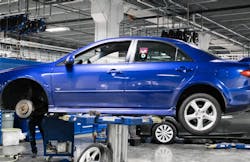How Independent Shops Can Thrive in the Mobility as a Service Market
This all stems from the following correlation: According to the IHS Markit, the mobility as a service industry (MaaS) will continue to grow in the next few years, as the global information provider predicts that global vehicle miles travelled will go up 65 percent between 2017 and 2040, while private vehicle sales sold in the U.S., Europe, China and India will decrease from 67 million to 54 million.
Ride-hailing companies like Uber and Lyft see self-driving technology as critical to their long-term financial health, since paying drivers cuts into company profits. To make money in the future, Lyft and Uber will need to find ways to own these vehicles, which, as John Possumato, the founder and CEO of the MaaS startup DriveItAway LLC, points out, means they will need to find ways to service these fleets.
Uber and Lyft’s full foray into autonomous vehicles and self-owning fleets might be a ways off, but Possumato says independent shops and service centers at dealerships should be prepared anyway.
To see the future of this industry, it’s vital to take a look at Uber and Lyft’s plans going forward, how dealerships and industry giants like Carl Icahn are taking advantage, and how independents can react.
Where Lyft and Uber Fit In
While Lyft’s ride sharing currently accounts for just .5 percent of all vehicle miles travelled in the U.S., Lyft’s CEO Logan Green believes that, over the next decade, 80 percent of vehicle miles traveled will be through ridesharing.
To prepare for this, along with the future of self-driving vehicles, Lyft has made a major investment in self-driving technology. Lyft launched a Level 5 self-driving engineering center in August 2017 to focus on the self-driving efforts, and a company spokesperson said its self-driving team will reach several hundred people by the end of 2018.
Uber has also invested heavily in its self-driving efforts with extensive tests in Arizona, Pittsburgh, San Francisco and Toronto.
Your Competition
As Lyft and Uber plan to grow over the years, what should shop owners be on the lookout for? During an interview with Ratchet+Wrench, Lyft declined to mention future plans on how it will service these vehicles, but Possumato says that Carl Icahn has already taken advantage of this with his enterprise. Icahn has stakes in Hertz, Lyft and Pep Boys. This allows him to rent out cars to Lyft drivers via Hertz, and then have them serviced at Pep Boys.
Pep Boys now offers free and reduced services for Lyft drivers, including free check engine light code pulls and free alignment checks. It also offers reduced service fees for brake services and preventative maintenance.
While Icahn’s groups use vertical integration, where a supply chain of a company is owned by that company, to capture this market share, there are some options for other shops to get involved, as well.
With DriveItAway LLC, Possumato works with franchises and independent dealers to maximize opportunities for service centers to begin to enter MaaS by servicing rideshare drivers today.
He believes dealer service centers, in particular, have a built-in infrastructure that lends itself well to servicing this niche. Dealerships can run fleets of older used vehicles (which could cost between $8,000–$15,000) as temporary vehicles to new rideshare drivers who don’t have a suitable vehicle, which in turns feeds the service facility with captive business, and establishes a relationship with ride-sharing companies.
How Independents Should React
However, smaller shops can also take advantage of this new customer base. Many shops have partnered with Lyft or Uber to have drivers sign up in the shop, which gives shops a direct link to those drivers and, ideally, an opportunity to turn them into long-term customers. Additionally, Uber and Lyft offer specific inspection sheets needed to pass or fail their services, which are available on their websites.
In an effort to prepare for the future impact of Uber and Lyft, Justin Naccarato from Oldsmar Automotive in Oldsmar, Fla., has specifically offered Uber and Lyft inspections to his client base for the past eight months, and promotes these services on his website. While he says it hasn’t been a huge moneymaker for the shop yet, he’s had over 40 new customers come in for inspections, and has already seen some returns from these customers coming back for repairs.
“If they’re local from this area, you hope to pick them up as a continuing customer,” Naccarato says. “It’s just a way to make extra revenue for the business.”
Even software companies, like CarServ, are trying to help their shops take advantage of ride sharing, as the company recently announced a partnership with Lyft. Through the application, a service advisor or user can order a Lyft directly through a customer’s account, which has their address saved as the default pickup and drop off point. In the next few months, CarServ’s CEO Mars Mundy says CarServ will work with its shops and Lyft to give coupon codes to Lyft drivers for certain services at CarServ’s shops.
“We know that facilities would love to have the Lyft drivers as customers, and it’s a nice convenience for the drivers as they might not have a regular shop that they go to,” Mundy says. “This could be a way for them to connect with a more tech-savvy shop.”

